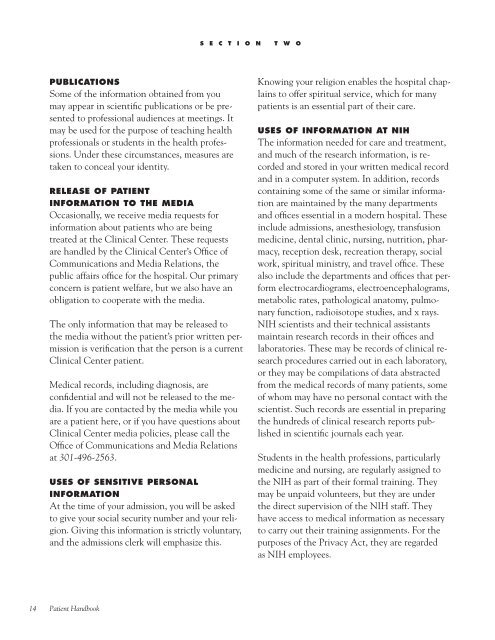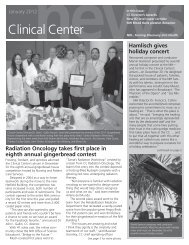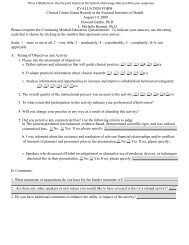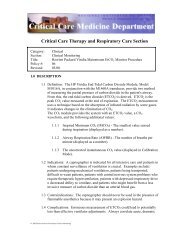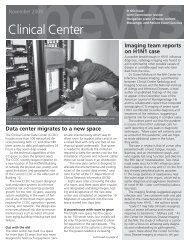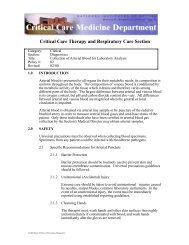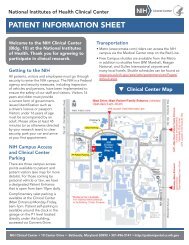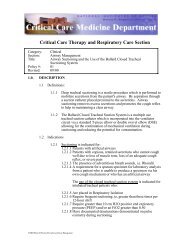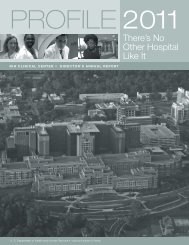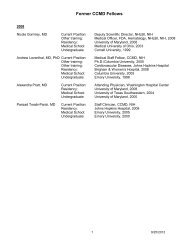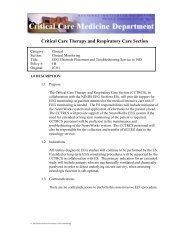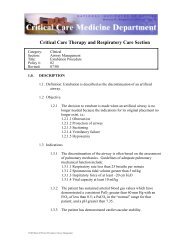Patient Handbook - NIH Clinical Center - National Institutes of Health
Patient Handbook - NIH Clinical Center - National Institutes of Health
Patient Handbook - NIH Clinical Center - National Institutes of Health
Create successful ePaper yourself
Turn your PDF publications into a flip-book with our unique Google optimized e-Paper software.
PUBLICATIONS<br />
Some <strong>of</strong> the information obtained from you<br />
may appear in scientific publications or be presented<br />
to pr<strong>of</strong>essional audiences at meetings. It<br />
may be used for the purpose <strong>of</strong> teaching health<br />
pr<strong>of</strong>essionals or students in the health pr<strong>of</strong>essions.<br />
Under these circumstances, measures are<br />
taken to conceal your identity.<br />
RELEASE OF PATIENT<br />
INFORMATION TO THE MEDIA<br />
Occasionally, we receive media requests for<br />
information about patients who are being<br />
treated at the <strong>Clinical</strong> <strong>Center</strong>. These requests<br />
are handled by the <strong>Clinical</strong> <strong>Center</strong>’s Office <strong>of</strong><br />
Communications and Media Relations, the<br />
public affairs <strong>of</strong>fice for the hospital. Our primary<br />
concern is patient welfare, but we also have an<br />
obligation to cooperate with the media.<br />
The only information that may be released to<br />
the media without the patient’s prior written permission<br />
is verification that the person is a current<br />
<strong>Clinical</strong> <strong>Center</strong> patient.<br />
Medical records, including diagnosis, are<br />
confidential and will not be released to the media.<br />
If you are contacted by the media while you<br />
are a patient here, or if you have questions about<br />
<strong>Clinical</strong> <strong>Center</strong> media policies, please call the<br />
Office <strong>of</strong> Communications and Media Relations<br />
at 301-496-2563.<br />
USES OF SENSITIVE PERSONAL<br />
INFORMATION<br />
At the time <strong>of</strong> your admission, you will be asked<br />
to give your social security number and your religion.<br />
Giving this information is strictly voluntary,<br />
and the admissions clerk will emphasize this.<br />
14 <strong>Patient</strong> <strong>Handbook</strong><br />
S E C T I O N T W O<br />
Knowing your religion enables the hospital chaplains<br />
to <strong>of</strong>fer spiritual service, which for many<br />
patients is an essential part <strong>of</strong> their care.<br />
USES OF INFORMATION AT <strong>NIH</strong><br />
The information needed for care and treatment,<br />
and much <strong>of</strong> the research information, is recorded<br />
and stored in your written medical record<br />
and in a computer system. In addition, records<br />
containing some <strong>of</strong> the same or similar information<br />
are maintained by the many departments<br />
and <strong>of</strong>fices essential in a modern hospital. These<br />
include admissions, anesthesiology, transfusion<br />
medicine, dental clinic, nursing, nutrition, pharmacy,<br />
reception desk, recreation therapy, social<br />
work, spiritual ministry, and travel <strong>of</strong>fice. These<br />
also include the departments and <strong>of</strong>fices that perform<br />
electrocardiograms, electroencephalograms,<br />
metabolic rates, pathological anatomy, pulmonary<br />
function, radioisotope studies, and x rays.<br />
<strong>NIH</strong> scientists and their technical assistants<br />
maintain research records in their <strong>of</strong>fices and<br />
laboratories. These may be records <strong>of</strong> clinical research<br />
procedures carried out in each laboratory,<br />
or they may be compilations <strong>of</strong> data abstracted<br />
from the medical records <strong>of</strong> many patients, some<br />
<strong>of</strong> whom may have no personal contact with the<br />
scientist. Such records are essential in preparing<br />
the hundreds <strong>of</strong> clinical research reports published<br />
in scientific journals each year.<br />
Students in the health pr<strong>of</strong>essions, particularly<br />
medicine and nursing, are regularly assigned to<br />
the <strong>NIH</strong> as part <strong>of</strong> their formal training. They<br />
may be unpaid volunteers, but they are under<br />
the direct supervision <strong>of</strong> the <strong>NIH</strong> staff. They<br />
have access to medical information as necessary<br />
to carry out their training assignments. For the<br />
purposes <strong>of</strong> the Privacy Act, they are regarded<br />
as <strong>NIH</strong> employees.


